Unit 8 Once upon a Time Section A Pronunciation 1a-2e 课件 (共54张PPT,含内嵌音频) 人教版(2024)七年级下册
文档属性
| 名称 | Unit 8 Once upon a Time Section A Pronunciation 1a-2e 课件 (共54张PPT,含内嵌音频) 人教版(2024)七年级下册 | 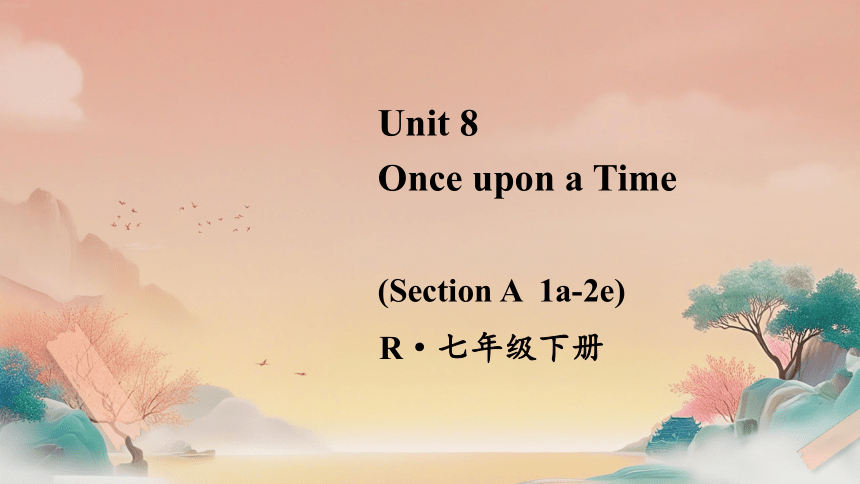 | |
| 格式 | pptx | ||
| 文件大小 | 60.8MB | ||
| 资源类型 | 教案 | ||
| 版本资源 | 人教版 | ||
| 科目 | 英语 | ||
| 更新时间 | 2025-07-19 11:33:59 | ||
图片预览

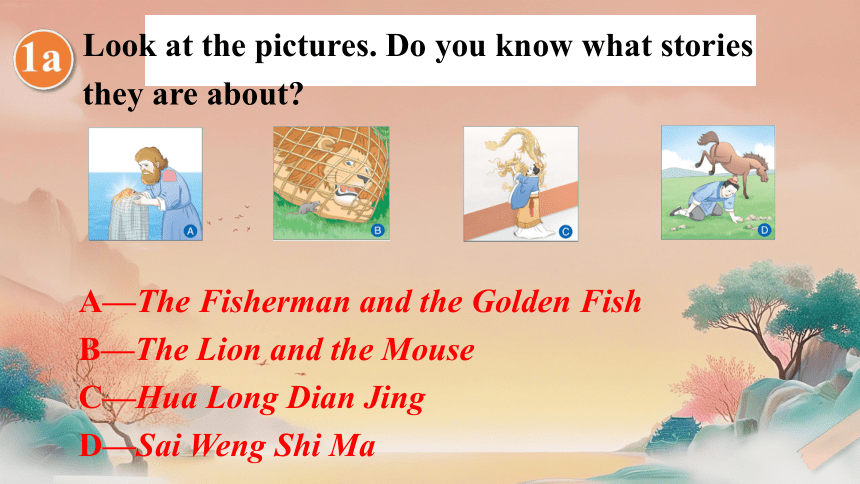
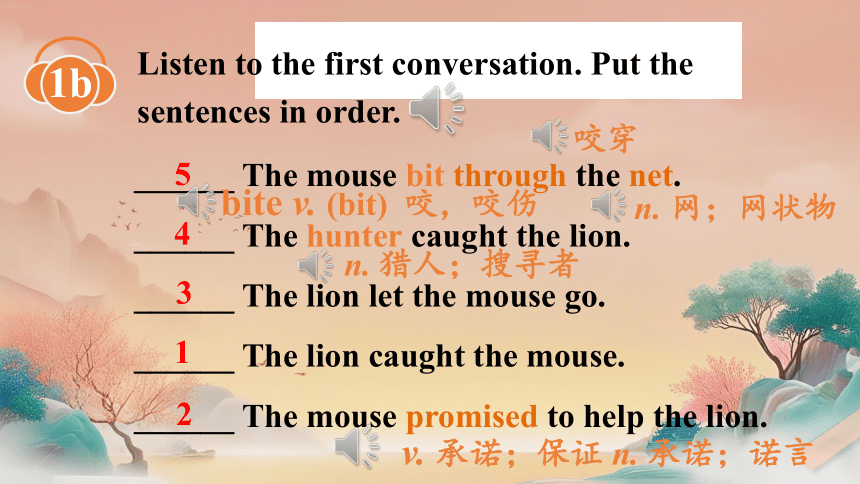
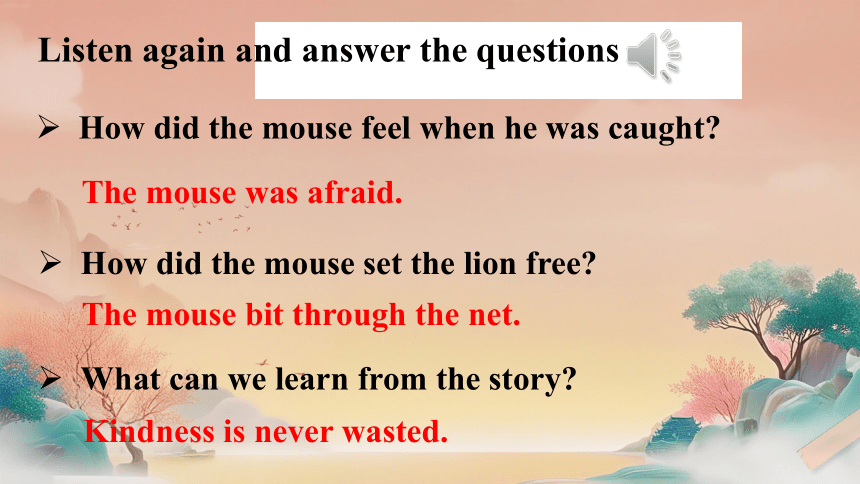
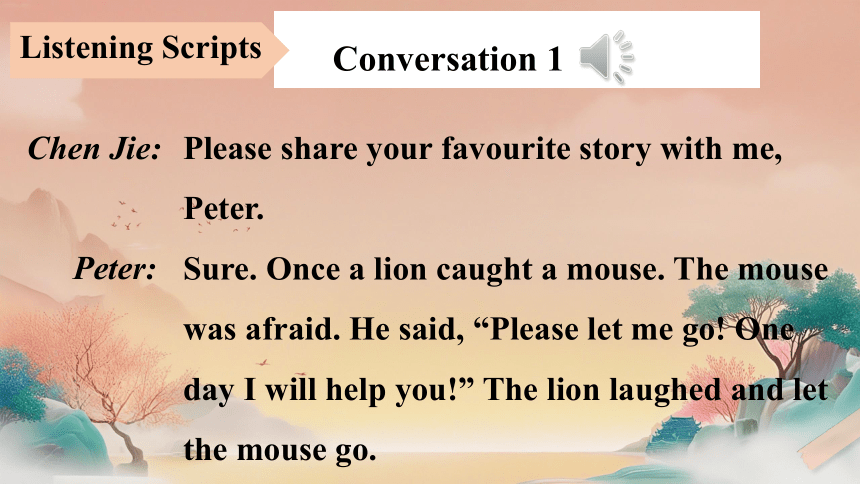
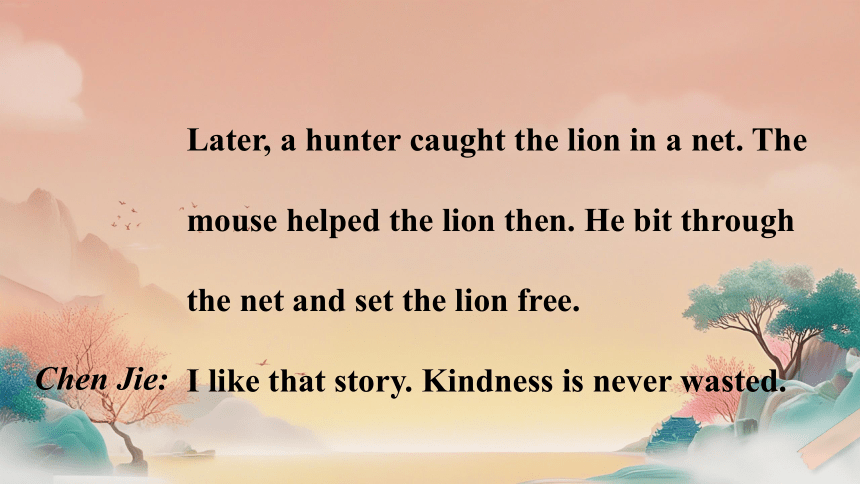
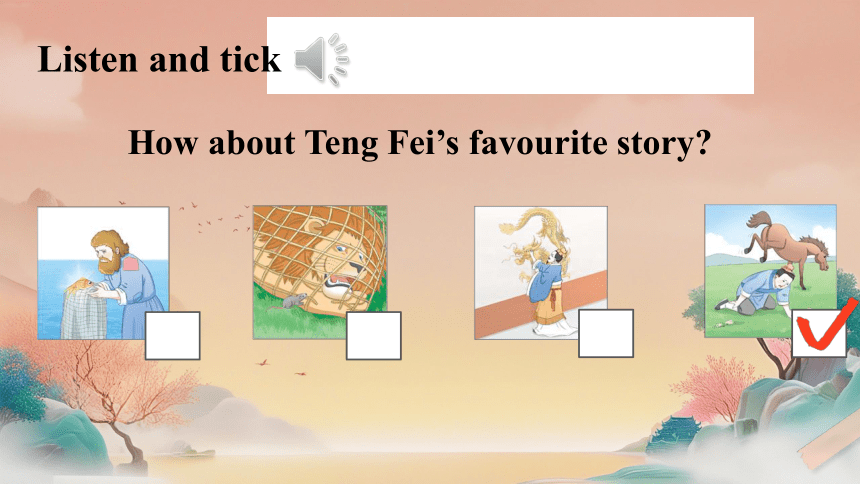
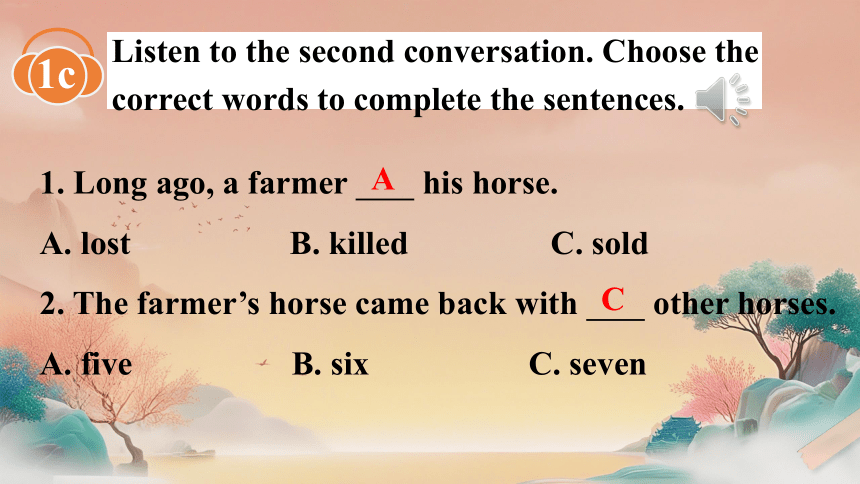
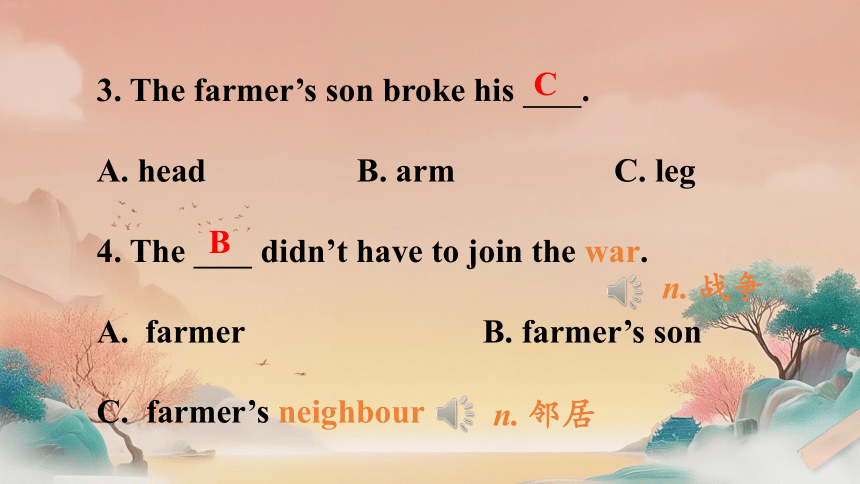
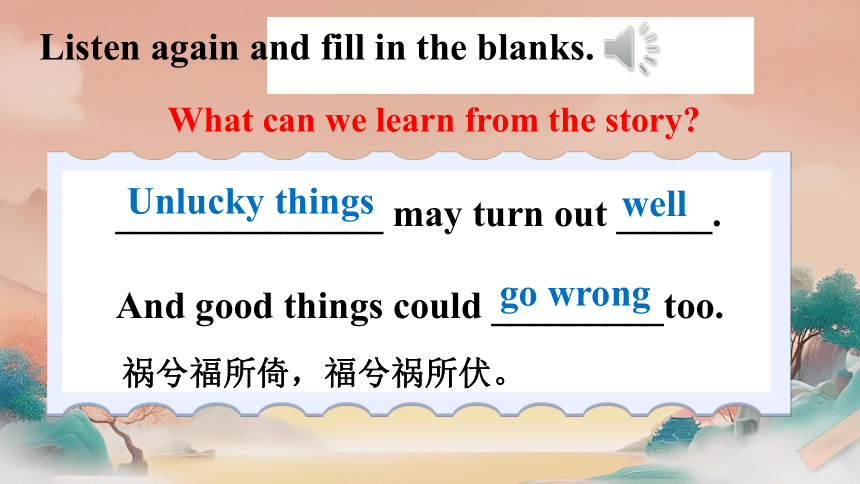
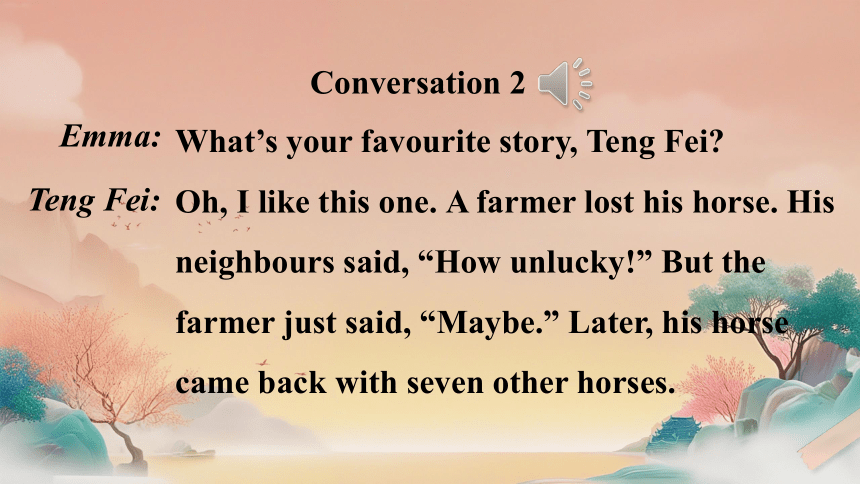
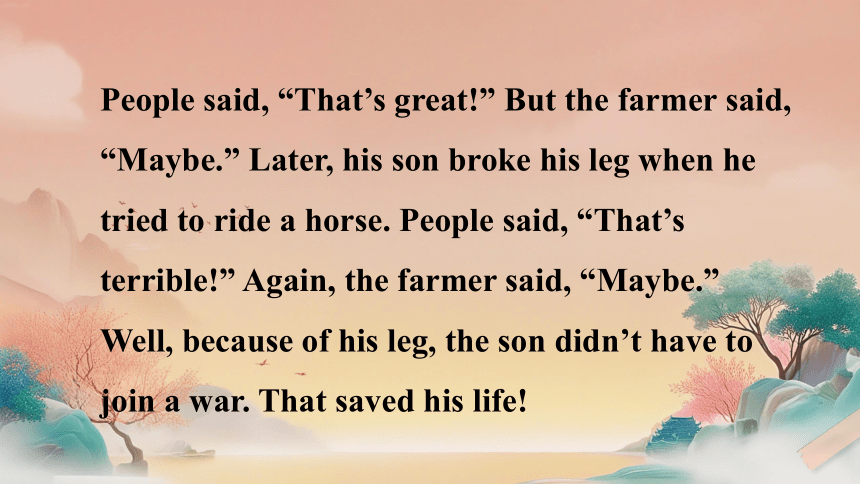
文档简介
(共54张PPT)
R·七年级下册
Unit 8
Once upon a Time
(Section A 1a-2e)
Look at the pictures. Do you know what stories they are about
1a
A—The Fisherman and the Golden Fish
B—The Lion and the Mouse
C—Hua Long Dian Jing
D—Sai Weng Shi Ma
Listen to the first conversation. Put the sentences in order.
1b
______ The mouse bit through the net.
______ The hunter caught the lion.
______ The lion let the mouse go.
______ The lion caught the mouse.
______ The mouse promised to help the lion.
5
4
3
1
2
v. 承诺;保证 n. 承诺;诺言
n. 猎人;搜寻者
n. 网;网状物
bite v. (bit) 咬,咬伤
咬穿
How did the mouse feel when he was caught
Listen again and answer the questions
How did the mouse set the lion free
What can we learn from the story
The mouse was afraid.
The mouse bit through the net.
Kindness is never wasted.
Listening Scripts
Please share your favourite story with me, Peter.
Sure. Once a lion caught a mouse. The mouse was afraid. He said, “Please let me go! One day I will help you!” The lion laughed and let the mouse go.
Conversation 1
Chen Jie:
Peter:
Later, a hunter caught the lion in a net. The mouse helped the lion then. He bit through the net and set the lion free.
I like that story. Kindness is never wasted.
Chen Jie:
How about Teng Fei’s favourite story
Listen and tick
Listen to the second conversation. Choose the correct words to complete the sentences.
1. Long ago, a farmer his horse.
A. lost B. killed C. sold
2. The farmer’s horse came back with other horses.
A. five B. six C. seven
A
C
1c
3. The farmer’s son broke his .
A. head B. arm C. leg
4. The didn’t have to join the war.
farmer B. farmer’s son
C. farmer’s neighbour
C
B
n. 战争
n. 邻居
Listen again and fill in the blanks.
What can we learn from the story
______________ may turn out _____. And good things could _________too.
祸兮福所倚,福兮祸所伏。
Unlucky things
well
go wrong
Conversation 2
Emma:
Teng Fei:
What’s your favourite story, Teng Fei
Oh, I like this one. A farmer lost his horse. His neighbours said, “How unlucky!” But the farmer just said, “Maybe.” Later, his horse came back with seven other horses.
People said, “That’s great!” But the farmer said, “Maybe.” Later, his son broke his leg when he tried to ride a horse. People said, “That’s terrible!” Again, the farmer said, “Maybe.” Well, because of his leg, the son didn’t have to join a war. That saved his life!
I see. Unlucky things may turn out well. And good things could go wrong too.
Yes, you never know.
Emma:
Teng Fei:
Listen to the two conversations again and answer the questions.
Why do you think the lion laughed when the mouse promised to help him
Because he thought the mouse was too small and weak to help him.
1d
Yes, I do. Because it teaches us a lesson that kindness is never wasted.
2. Do you like the story about the lion and the
mouse Why or why not
3. Did the farmer feel very sad when bad
things happened
No, he didn’t.
4. Was the farmer wise Why or why not
Yes, he was. Because he knew unlucky things might turn out well. And good things could go wrong too.
adj. 明智的;高明的
Let’s think
How can we remember a story quickly
…
time
place
character
plot
story
Let’s conclude
Time
Place
Character
Plot
The Lion and the Mouse
Sai Weng Shi Ma
The past
The past
A lion
A mouse
A hunter
Farmer
Horse
Son
Neighbours
caught a mouse →
let the mouse go →
caught the lion →
set the lion free
lost horse →
horse came back →
son broke his leg →
saved son’s life →
Which story do you like more Retell it to a partner.
Pay attention to the tense.
1e
Retell the story
Once a lion caught…/ The mouse/afraid/said, “Please…go! One day…”
The lion laughed/let the mouse go...
Later, ... caught the lion ... a net. The mouse...
... helped ... / bit through... and set... free.
Reference
I prefer the story The Lion and the Mouse. Let me tell it to you. A lion caught a mouse. The mouse asked to let him go and said he would help the lion one day. The lion laughed and let him go. Later, a hunter caught the lion in a net. The mouse bit through the net and saved the lion.
Retell the story
A farmer lost a horse.
His neighbours said.../ The farmer said... Later... came back...
... because of..., the son... That...
People said... But the farmer said... Later... broke... when...ride. People said... Again, the farmer said...
Reference
I prefer the story Sai Weng Shi Ma. Let me tell it to you. A farmer lost his horse. His neighbours thought it is unlucky, but the farmer said “Maybe.” Later, the horse returned with seven horses. People said it was great, but the farmer still said “Maybe.” Then his son broke his leg while trying to ride a horse. People thought it was terrible but the farmer said “Maybe.” Due to his injured leg, the son didn’t have to join a war and this saved his life.
upon, once upon a time, long ago, promise, hunter, net, bite, bite through, war, wise, neighbour
Words and phrases:
Talk about your favourite story and tell the story.
Summary
Please share your favourite story with me./
What’s your favourite story
Once upon a time.../Once...
Homework
1. Listen and repeat the two conversations in 1d.
2. Retell the story we learned in your own words.
Listen and repeat. Add one more word to each group.
ch
ph
sh
th
wh
/t /
/f/
/ /
/θ/
/ /
/w/
/h/
chair
which
______
physics
elephant
______
ship
fashion
______
throw
maths
______
then
with
______
why
where
______
who
whose
_____
teach
photo
shine
thirsty
there
what
whom
Read after the tape
1
辅音字母组合
th
读音
/ /
发音要领
/ /是浊辅音,发音时声带振动。舌尖轻抵上齿背或放在上下齿之间,让气流从舌齿间缝隙中挤出时摩擦成音。
例词
that 那个than 比
mother 母亲
续上表
辅音字母组合
wh
读音
/w/
发音要领
/w/是浊辅音,发音时声带振动。舌后部向软腭抬起,双唇突出,并呈小圆口形。发音瞬间滑向后面的元音。/w/又称半元音。
例词
what 什么white
白色(的)
whale 鲸
In pairs, read the conversation aloud slowly. Then listen and read it again at a normal speed. Notice how the letters in bold change sounds.
A: Did you read Little Women for English class It’s great!
B: No, I didn’t. Would you like to tell me about it
A: Well, I’d like to. But don’t you want to read it by
yourself
What phenomenon
(现象) is it
2
当两个音相邻时,其中一个音常常受另一个邻音的影响而变成与其邻音相同,或相似,或变成第三个音,这种变音现象叫作音的同化。
音的同化(Assimilation)
同化现象是英语连贯说话中一种自然的变化,初学者应根据示范朗读体会和模仿学习。
Nice to meet you. /mi t ju/→ /mi t u/
What would you like to drink, tea or coffee /w d ju/ → /w d u/
What did you do last night /d d ju/ → /d d u/
汉斯·克里斯汀·安徒生(Hans Christian Andersen,1805年4月2日~1875年8月4日),又译汉斯·克里斯蒂安·安德森等,19世纪丹麦童话作家,被誉为“世界儿童文学的太阳”。
Introduction of the author
Emma is sharing a story with her class.
Listen and circle the coloured words you hear.
Here’s The Emperor’s New Clothes by Hans Christian Andersen.
Once upon a time, an emperor loved / liked clothes very much. He wanted to buy some new clothes.
2a
Two brothers came and lied to him, “We can make wonderful clothes! But only clever / smart people can see them!” They pretended to make the clothes.
The emperor’s officials couldn’t see the clothes, but they said, “What lovely clothes!” The emperor couldn’t see anything either, but he said, “They’re beautiful!” No one wanted to look silly.
The emperor decided to show everyone his new clothes. People in the street /city praised them. They were afraid to look silly too!
Suddenly, a boy cried / shouted, “Look! The emperor has no clothes on!” Everyone looked at one another. They started / began laughing.
The end! Did you like the story Please tell me what you think!
Analyze the text
Here’s The Emperor’s New Clothes by Hans Christian Andersen. Once upon a time, an emperor liked clothes very much. He wanted to buy some new clothes.
表示施事者
Two brothers came and lied to him, “We can make wonderful clothes! But only clever people can see them!” They pretended to make the clothes.
The emperor’s officials couldn’t see the clothes, but they said, “What lovely clothes!” The emperor couldn’t see anything either, but he said, “They’re beautiful!” No one wanted to look silly.
v. 假装;伪装
v. 撒谎 n. 谎言
n. 官员;高级职员
adj. 愚蠢的;傻的
lie to sb 对某人撒谎
pretend to do sth 假装做某事
either 也 用于肯定句句末 too 也 用于肯定句或疑问句句末
what 引导的感叹句
1. What a / an + 形容词 + 可数名词单数(+主语+谓语)!
2. What + 形容词 + 可数名词复数/不可数名词
(+主语+谓语)!
What an interesting book it is!
What fat hens!
What hot weather it is!
拓展
how 引导的感叹句的结构为“How + 形容词/副词 (+主语+谓语)!”
How wonderful the music is!
巧记
感叹句的用法
感叹句,并不难,what与how应在前。
形容词、副词跟着how,what后面名词连。
名词若是可数单,前带冠词a或an。
主语、谓语放后面,省略它们也常见。
The emperor decided to show everyone his new clothes. People in the street praised them. They were afraid to look silly too!
Suddenly, a boy shouted, “Look! The emperor has no clothes on!” Everyone looked at one another. They started laughing.
The end! Did you like the story Please tell me what you think!
v. & n. 赞美;赞扬
adv. 突然地;出乎意料地
= each other
start / begin doing sth 开始做某事
show sb sth = show sth to sb
给某人看某物
Please show me your new sweater.
= Please show your new sweater to me.
decide v. 决定
decide to do sth 决定做某事
afraid adj.害怕的;担心的
afraid to do sth 害怕做某事
How did people respond to the new clothes at first
Officials
The emperor
People in the street
A boy
What lovely clothes!
They are beautiful!
They praised the clothes.
Look! The emperor has no clothes on!
2b
Read the story. Complete the flow chart.
An emperor wanted to buy new clothes.
Two ________ lied to the emperor.
They _________ to make beautiful clothes.
The emperor and his officials couldn’t ______ the clothes.
brothers
pretended
see
The emperor _______ people his new clothes.
People _______the clothes at first.
They ________ when a boy told the truth.
showed
praised
laughed
truth n. 真相;事实
tell the truth 说实话
起初,最初 反义短语为at last
Read the story again and answer the questions.
1. What did the two brothers say about their clothes
2. Why did the emperor and his officials praise the clothes
3. Why did the people in the street praise the clothes at first
4. Why do you think the boy told the truth
5. Why do you think everyone started laughing at the end
2c
最后,在末尾
What did the two brothers say about their clothes
Check your answers
They said only clever people could see them.
Because they didn’t want to look silly.
2. Why did the emperor and his officials praise the
clothes
3. Why did the people in the street praise the
clothes at first
Because they were afraid to look silly too.
4. Why do you think the boy told the truth
Because he was honest enough to tell the truth.
5. Why do you think everyone started laughing
at the end
Because the truth came out. It was funny to see the silly situation.
Which characters from the story do you think said the sentences
1. “We can make a lot of money by lying to the
emperor.” one of the brothers
2. “There are two brothers outside. They say that they
can make you fine clothes.”_________________
3. “Oh! Where are my new clothes I can’t see them.
Am I silly That can’t be true!”___________
one of the officials
the emperor
2d
make money 赚钱
“by + 动词-ing形式”表示方式、手段、方法等。
adj. 符合事实的;真正的
4. “1 can’t see the emperor’s clothes. But everyone in
the street is praising the clothes! I hate to be
different. I should praise them too.”
_________________________
5. “What’s everyone talking about The emperor isn’t
wearing anything! I know he isn’t!”___________
one of the people in the street
the boy
hate v. 不喜欢;厌恶;讨厌
hate to do sth
讨厌做某事
everyone 做主语,谓语动词要用第三人称单数形式
Let’s think
What are the personalities of the characters in the story
The
emperor
The
brothers
The
officials
The boy
The
people
vain
虚荣的
silly
愚蠢的
…
crafty
狡猾的
greedy
贪婪的
…
hypocritical
虚伪的
cowardly
懦弱的
…
innocent
天真的
brave
勇敢的
…
unthinking
缺乏思考的
…
Do you like the story Please tell me what you think!
Free talk
I like the story.
Because...
I don’t like the story. Because...
Words: vain, silly, crafty, greedy, unthinking...
Listen to the story again. Then retell it to a partner.
Tips
复述的时候可根据故事发展情节,人物性格特征以及事件发生场景等来用自己的话总结归纳。
2e
Let’s retell
Once upon a time,
an emperor loved…
→…wanted…
Two brothers came →lied to him...→ They pretended…
The emperor’s official…
The emperor…
The emperor decided…
→People in the street…
Suddenly, a boy…
→Everyone…
How would the emperor respond on site
Reference
Once upon a time, an emperor loved beautiful clothes. Two brothers said they could make special clothes. The emperor decided to show everyone his new clothes in the street. People were afraid to say he had no clothes on until a child shouted the truth. It tells us to be brave and tell the truth.
Summary
Pronunciation:
ch ph sh th wh
/t /
/f/
/ /
/θ/
/ /
/w/
/h/
Words and phrases:
emperor, lie, pretend, official, silly, decide, praise, afraid, suddenly, at first, truth, tell the truth, make money, true, hate
Story: The Emperor’s New Clothes
Homework
1. Listen and repeat the words in Pronunciation 1.
2. Discuss with your partner about your feelings
after learning the story.
3. Write and retell the story in your exercise book.
R·七年级下册
Unit 8
Once upon a Time
(Section A 1a-2e)
Look at the pictures. Do you know what stories they are about
1a
A—The Fisherman and the Golden Fish
B—The Lion and the Mouse
C—Hua Long Dian Jing
D—Sai Weng Shi Ma
Listen to the first conversation. Put the sentences in order.
1b
______ The mouse bit through the net.
______ The hunter caught the lion.
______ The lion let the mouse go.
______ The lion caught the mouse.
______ The mouse promised to help the lion.
5
4
3
1
2
v. 承诺;保证 n. 承诺;诺言
n. 猎人;搜寻者
n. 网;网状物
bite v. (bit) 咬,咬伤
咬穿
How did the mouse feel when he was caught
Listen again and answer the questions
How did the mouse set the lion free
What can we learn from the story
The mouse was afraid.
The mouse bit through the net.
Kindness is never wasted.
Listening Scripts
Please share your favourite story with me, Peter.
Sure. Once a lion caught a mouse. The mouse was afraid. He said, “Please let me go! One day I will help you!” The lion laughed and let the mouse go.
Conversation 1
Chen Jie:
Peter:
Later, a hunter caught the lion in a net. The mouse helped the lion then. He bit through the net and set the lion free.
I like that story. Kindness is never wasted.
Chen Jie:
How about Teng Fei’s favourite story
Listen and tick
Listen to the second conversation. Choose the correct words to complete the sentences.
1. Long ago, a farmer his horse.
A. lost B. killed C. sold
2. The farmer’s horse came back with other horses.
A. five B. six C. seven
A
C
1c
3. The farmer’s son broke his .
A. head B. arm C. leg
4. The didn’t have to join the war.
farmer B. farmer’s son
C. farmer’s neighbour
C
B
n. 战争
n. 邻居
Listen again and fill in the blanks.
What can we learn from the story
______________ may turn out _____. And good things could _________too.
祸兮福所倚,福兮祸所伏。
Unlucky things
well
go wrong
Conversation 2
Emma:
Teng Fei:
What’s your favourite story, Teng Fei
Oh, I like this one. A farmer lost his horse. His neighbours said, “How unlucky!” But the farmer just said, “Maybe.” Later, his horse came back with seven other horses.
People said, “That’s great!” But the farmer said, “Maybe.” Later, his son broke his leg when he tried to ride a horse. People said, “That’s terrible!” Again, the farmer said, “Maybe.” Well, because of his leg, the son didn’t have to join a war. That saved his life!
I see. Unlucky things may turn out well. And good things could go wrong too.
Yes, you never know.
Emma:
Teng Fei:
Listen to the two conversations again and answer the questions.
Why do you think the lion laughed when the mouse promised to help him
Because he thought the mouse was too small and weak to help him.
1d
Yes, I do. Because it teaches us a lesson that kindness is never wasted.
2. Do you like the story about the lion and the
mouse Why or why not
3. Did the farmer feel very sad when bad
things happened
No, he didn’t.
4. Was the farmer wise Why or why not
Yes, he was. Because he knew unlucky things might turn out well. And good things could go wrong too.
adj. 明智的;高明的
Let’s think
How can we remember a story quickly
…
time
place
character
plot
story
Let’s conclude
Time
Place
Character
Plot
The Lion and the Mouse
Sai Weng Shi Ma
The past
The past
A lion
A mouse
A hunter
Farmer
Horse
Son
Neighbours
caught a mouse →
let the mouse go →
caught the lion →
set the lion free
lost horse →
horse came back →
son broke his leg →
saved son’s life →
Which story do you like more Retell it to a partner.
Pay attention to the tense.
1e
Retell the story
Once a lion caught…/ The mouse/afraid/said, “Please…go! One day…”
The lion laughed/let the mouse go...
Later, ... caught the lion ... a net. The mouse...
... helped ... / bit through... and set... free.
Reference
I prefer the story The Lion and the Mouse. Let me tell it to you. A lion caught a mouse. The mouse asked to let him go and said he would help the lion one day. The lion laughed and let him go. Later, a hunter caught the lion in a net. The mouse bit through the net and saved the lion.
Retell the story
A farmer lost a horse.
His neighbours said.../ The farmer said... Later... came back...
... because of..., the son... That...
People said... But the farmer said... Later... broke... when...ride. People said... Again, the farmer said...
Reference
I prefer the story Sai Weng Shi Ma. Let me tell it to you. A farmer lost his horse. His neighbours thought it is unlucky, but the farmer said “Maybe.” Later, the horse returned with seven horses. People said it was great, but the farmer still said “Maybe.” Then his son broke his leg while trying to ride a horse. People thought it was terrible but the farmer said “Maybe.” Due to his injured leg, the son didn’t have to join a war and this saved his life.
upon, once upon a time, long ago, promise, hunter, net, bite, bite through, war, wise, neighbour
Words and phrases:
Talk about your favourite story and tell the story.
Summary
Please share your favourite story with me./
What’s your favourite story
Once upon a time.../Once...
Homework
1. Listen and repeat the two conversations in 1d.
2. Retell the story we learned in your own words.
Listen and repeat. Add one more word to each group.
ch
ph
sh
th
wh
/t /
/f/
/ /
/θ/
/ /
/w/
/h/
chair
which
______
physics
elephant
______
ship
fashion
______
throw
maths
______
then
with
______
why
where
______
who
whose
_____
teach
photo
shine
thirsty
there
what
whom
Read after the tape
1
辅音字母组合
th
读音
/ /
发音要领
/ /是浊辅音,发音时声带振动。舌尖轻抵上齿背或放在上下齿之间,让气流从舌齿间缝隙中挤出时摩擦成音。
例词
that 那个than 比
mother 母亲
续上表
辅音字母组合
wh
读音
/w/
发音要领
/w/是浊辅音,发音时声带振动。舌后部向软腭抬起,双唇突出,并呈小圆口形。发音瞬间滑向后面的元音。/w/又称半元音。
例词
what 什么white
白色(的)
whale 鲸
In pairs, read the conversation aloud slowly. Then listen and read it again at a normal speed. Notice how the letters in bold change sounds.
A: Did you read Little Women for English class It’s great!
B: No, I didn’t. Would you like to tell me about it
A: Well, I’d like to. But don’t you want to read it by
yourself
What phenomenon
(现象) is it
2
当两个音相邻时,其中一个音常常受另一个邻音的影响而变成与其邻音相同,或相似,或变成第三个音,这种变音现象叫作音的同化。
音的同化(Assimilation)
同化现象是英语连贯说话中一种自然的变化,初学者应根据示范朗读体会和模仿学习。
Nice to meet you. /mi t ju/→ /mi t u/
What would you like to drink, tea or coffee /w d ju/ → /w d u/
What did you do last night /d d ju/ → /d d u/
汉斯·克里斯汀·安徒生(Hans Christian Andersen,1805年4月2日~1875年8月4日),又译汉斯·克里斯蒂安·安德森等,19世纪丹麦童话作家,被誉为“世界儿童文学的太阳”。
Introduction of the author
Emma is sharing a story with her class.
Listen and circle the coloured words you hear.
Here’s The Emperor’s New Clothes by Hans Christian Andersen.
Once upon a time, an emperor loved / liked clothes very much. He wanted to buy some new clothes.
2a
Two brothers came and lied to him, “We can make wonderful clothes! But only clever / smart people can see them!” They pretended to make the clothes.
The emperor’s officials couldn’t see the clothes, but they said, “What lovely clothes!” The emperor couldn’t see anything either, but he said, “They’re beautiful!” No one wanted to look silly.
The emperor decided to show everyone his new clothes. People in the street /city praised them. They were afraid to look silly too!
Suddenly, a boy cried / shouted, “Look! The emperor has no clothes on!” Everyone looked at one another. They started / began laughing.
The end! Did you like the story Please tell me what you think!
Analyze the text
Here’s The Emperor’s New Clothes by Hans Christian Andersen. Once upon a time, an emperor liked clothes very much. He wanted to buy some new clothes.
表示施事者
Two brothers came and lied to him, “We can make wonderful clothes! But only clever people can see them!” They pretended to make the clothes.
The emperor’s officials couldn’t see the clothes, but they said, “What lovely clothes!” The emperor couldn’t see anything either, but he said, “They’re beautiful!” No one wanted to look silly.
v. 假装;伪装
v. 撒谎 n. 谎言
n. 官员;高级职员
adj. 愚蠢的;傻的
lie to sb 对某人撒谎
pretend to do sth 假装做某事
either 也 用于肯定句句末 too 也 用于肯定句或疑问句句末
what 引导的感叹句
1. What a / an + 形容词 + 可数名词单数(+主语+谓语)!
2. What + 形容词 + 可数名词复数/不可数名词
(+主语+谓语)!
What an interesting book it is!
What fat hens!
What hot weather it is!
拓展
how 引导的感叹句的结构为“How + 形容词/副词 (+主语+谓语)!”
How wonderful the music is!
巧记
感叹句的用法
感叹句,并不难,what与how应在前。
形容词、副词跟着how,what后面名词连。
名词若是可数单,前带冠词a或an。
主语、谓语放后面,省略它们也常见。
The emperor decided to show everyone his new clothes. People in the street praised them. They were afraid to look silly too!
Suddenly, a boy shouted, “Look! The emperor has no clothes on!” Everyone looked at one another. They started laughing.
The end! Did you like the story Please tell me what you think!
v. & n. 赞美;赞扬
adv. 突然地;出乎意料地
= each other
start / begin doing sth 开始做某事
show sb sth = show sth to sb
给某人看某物
Please show me your new sweater.
= Please show your new sweater to me.
decide v. 决定
decide to do sth 决定做某事
afraid adj.害怕的;担心的
afraid to do sth 害怕做某事
How did people respond to the new clothes at first
Officials
The emperor
People in the street
A boy
What lovely clothes!
They are beautiful!
They praised the clothes.
Look! The emperor has no clothes on!
2b
Read the story. Complete the flow chart.
An emperor wanted to buy new clothes.
Two ________ lied to the emperor.
They _________ to make beautiful clothes.
The emperor and his officials couldn’t ______ the clothes.
brothers
pretended
see
The emperor _______ people his new clothes.
People _______the clothes at first.
They ________ when a boy told the truth.
showed
praised
laughed
truth n. 真相;事实
tell the truth 说实话
起初,最初 反义短语为at last
Read the story again and answer the questions.
1. What did the two brothers say about their clothes
2. Why did the emperor and his officials praise the clothes
3. Why did the people in the street praise the clothes at first
4. Why do you think the boy told the truth
5. Why do you think everyone started laughing at the end
2c
最后,在末尾
What did the two brothers say about their clothes
Check your answers
They said only clever people could see them.
Because they didn’t want to look silly.
2. Why did the emperor and his officials praise the
clothes
3. Why did the people in the street praise the
clothes at first
Because they were afraid to look silly too.
4. Why do you think the boy told the truth
Because he was honest enough to tell the truth.
5. Why do you think everyone started laughing
at the end
Because the truth came out. It was funny to see the silly situation.
Which characters from the story do you think said the sentences
1. “We can make a lot of money by lying to the
emperor.” one of the brothers
2. “There are two brothers outside. They say that they
can make you fine clothes.”_________________
3. “Oh! Where are my new clothes I can’t see them.
Am I silly That can’t be true!”___________
one of the officials
the emperor
2d
make money 赚钱
“by + 动词-ing形式”表示方式、手段、方法等。
adj. 符合事实的;真正的
4. “1 can’t see the emperor’s clothes. But everyone in
the street is praising the clothes! I hate to be
different. I should praise them too.”
_________________________
5. “What’s everyone talking about The emperor isn’t
wearing anything! I know he isn’t!”___________
one of the people in the street
the boy
hate v. 不喜欢;厌恶;讨厌
hate to do sth
讨厌做某事
everyone 做主语,谓语动词要用第三人称单数形式
Let’s think
What are the personalities of the characters in the story
The
emperor
The
brothers
The
officials
The boy
The
people
vain
虚荣的
silly
愚蠢的
…
crafty
狡猾的
greedy
贪婪的
…
hypocritical
虚伪的
cowardly
懦弱的
…
innocent
天真的
brave
勇敢的
…
unthinking
缺乏思考的
…
Do you like the story Please tell me what you think!
Free talk
I like the story.
Because...
I don’t like the story. Because...
Words: vain, silly, crafty, greedy, unthinking...
Listen to the story again. Then retell it to a partner.
Tips
复述的时候可根据故事发展情节,人物性格特征以及事件发生场景等来用自己的话总结归纳。
2e
Let’s retell
Once upon a time,
an emperor loved…
→…wanted…
Two brothers came →lied to him...→ They pretended…
The emperor’s official…
The emperor…
The emperor decided…
→People in the street…
Suddenly, a boy…
→Everyone…
How would the emperor respond on site
Reference
Once upon a time, an emperor loved beautiful clothes. Two brothers said they could make special clothes. The emperor decided to show everyone his new clothes in the street. People were afraid to say he had no clothes on until a child shouted the truth. It tells us to be brave and tell the truth.
Summary
Pronunciation:
ch ph sh th wh
/t /
/f/
/ /
/θ/
/ /
/w/
/h/
Words and phrases:
emperor, lie, pretend, official, silly, decide, praise, afraid, suddenly, at first, truth, tell the truth, make money, true, hate
Story: The Emperor’s New Clothes
Homework
1. Listen and repeat the words in Pronunciation 1.
2. Discuss with your partner about your feelings
after learning the story.
3. Write and retell the story in your exercise book.
同课章节目录
